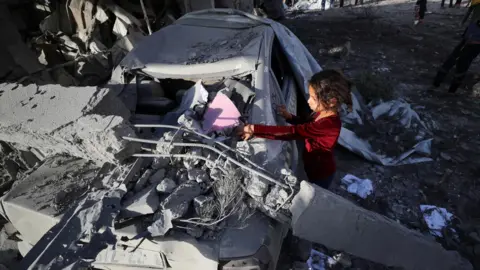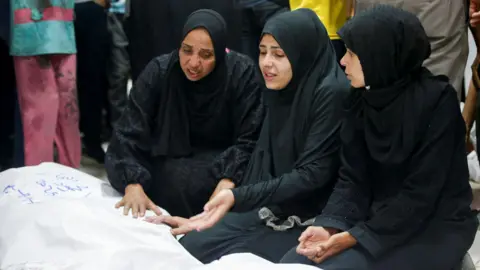Israeli strikes across Gaza kill 80, hospitals and rescuers say
 Reuters
ReutersAt least 80 people have been killed in Israeli strikes across Gaza, hospitals and first responders say.
The Indonesian hospital said 22 children and 15 women were among 50 people who died when several homes in the northern Jabalia area were hit overnight. Nearby al-Awda hospital said it had received the bodies of another nine people, seven of them children.
The Israeli military said it struck Hamas and Palestinian Islamic Jihad fighters in the north. It had warned residents of Jabalia and neighbouring areas to evacuate on Tuesday after rockets were launched into Israel.
It came as the UN's humanitarian chief urged members of the UN Security Council to take action to "prevent genocide" in Gaza.
Speaking at a meeting in New York on Tuesday, Tom Fletcher accused Israel of "deliberately and unashamedly imposing inhumane conditions on civilians".
He also called on Israel to lift its 10-week blockade on Gaza and criticised the Israeli-US plan to take over the distribution of humanitarian aid by using private companies, saying it was a "fig leaf for further violence and displacement" of Palestinians.
Israel's envoy to the UN, Danny Danon, said the accusations were "baseless and outrageous".
He insisted the existing system for aid was "broken" because it was being used to help Hamas's war effort - an allegation both the UN and the armed group have denied.
Residents of Jabalia town and its refugee camp reported hearing multiple explosions overnight, and videos shared by activists showed flames lighting up the sky.
One video shared online showed at least 14 bodies wrapped in blankets and white shrouds on the floor of the Indonesian hospital.
Hadi Moqbel, 42, said several members of his family were killed.
"They fired two rockets, they told us the house of Moqbel [had been hit]," he told Reuters news agency as he clambered over the destroyed building.
"We came running, we saw body parts on the ground, children killed, [a] woman killed and a baby killed... He was two months old."
The director of al-Awda hospital said in an audio message that it was struggling to deal with the 52 injured people brought there for treatment after the strikes because of the shortages of medical supplies and fuel for its electricity generators, with the latter forcing the closure of several departments.
The Hamas-run Civil Defence agency reported that 80 people had been killed in Israeli strikes across the territory since dawn, including 59 in the north.
The Israeli military said in a statement that it "struck Hamas and Islamic Jihad terrorists" in northern Gaza overnight. It added that "numerous steps were taken to mitigate the risk of harming civilians".
On Tuesday night, the military had issued what it described as a "final warning" to residents of Jabalia and neighbouring areas. It ordered them to evacuate immediately to Gaza City, saying Israeli forces would "attack with great force any area from which rockets are launched".
The military said three rockets launched from Gaza crossed into Israeli territory, triggering sirens in Israeli border communities and the town of Sderot. Two of the rockets were intercepted by the Israeli air force and the third fell in an open area, it added.
PIJ - an armed group that like its ally Hamas is proscribed as a terrorist organisation by Israel, the US, UK and other countries - said it launched the rockets in response to what it called "Zionist massacres".
On Wednesday afternoon, the Israeli military issued new evacuation orders for six parts of the northern Rimal neighbourhood of Gaza City, warning that there would be strikes "due to Hamas's exploitation of civilian areas for terrorist activities".
An infographic identified the affected areas as al-Shifa hospital, the Islamic University, and the al-Shati, Carmel, Mustafa Hafez and al-Furqan school complexes, and alleged that they contained Hamas command centres, structures and meeting points.
The areas are packed with tents housing thousands of displaced people.
Al-Shifa is also one of only 22 partially functional hospitals in Gaza. It was largely destroyed in a two-week raid by Israeli forces last year but has since reopened its emergency department.
 Reuters
ReutersIsrael cut off all deliveries of aid and other supplies to Gaza on 2 March and resumed its offensive against Hamas on 18 March after the collapse of a two-month ceasefire.
The UN says 20% of the 2.1 million population has been displaced again, and that 70% of Gaza is now either within Israeli military "no-go" zones or under evacuation orders.
Severe shortages of food and fuel have forced all UN-supported bakeries and more than 60% of the 180 community kitchens providing hot meals to shut down.
A UN-backed assessment released on Monday warned that the entire population was facing high levels of acute food insecurity, with half a million people facing starvation.
The UN has said Israel is obliged under international law to ensure food and medical supplies for Gaza's population. Israel has said it is complying with international law and there is no shortage of aid because thousands of lorry loads entered during the ceasefire.
Palestinians are hoping Hamas's decision on Monday to release the last living Israeli-American hostage in Gaza, Edan Alexander, could pave the way for a possible new ceasefire deal with Israel and the end of the blockade.
Hamas said it freed Mr Alexander as a goodwill gesture to US President Donald Trump, who is visiting the Middle East this week.
On Wednesday morning, Trump told a summit of Gulf leaders in Riyadh that he was hopeful that more of the 58 hostages still being held by Hamas in Gaza would be freed.
"All hostages must be released as a stepping stone to peace," he said. "I think that's going to be happening."
At the same time, his special envoys Steve Witkoff and Adam Boehler participated in a new round of indirect talks in Doha along with officials from regional mediators Qatar and Egypt.
Later, Israeli Prime Minister Benjamin Netanyahu's office also said he had a "lengthy" discussion with Witkoff by telephone "on the issue of the hostages".
More than 65 former hostages meanwhile signed a letter urging the Israeli government to seize a "genuine opportunity to return to the negotiating table" and secure the release of all the hostages. "Please do not walk away until a comprehensive deal is signed," they said.
Netanyahu has said Israel is planning to expand its military offensive in Gaza and that nothing will stop the war.
He told injured reservist soldiers on Monday that Israeli forces would go into the territory in the coming days "with full force to complete the operation" to destroy Hamas.
"There will be no situation where we stop the war. A temporary ceasefire might happen, but we are going all the way," he added.
Hamas has refused to release the remaining hostages unless Israel agrees to a permanent ceasefire and withdraws from Gaza.
On Tuesday, a massive Israeli air strike on the European hospital's compound in Khan Younis killed at least 28 people, according to local officials.
The Israeli military described it as "a precise strike on Hamas terrorists who were operating in a command-and-control centre" underneath the hospital.
Israeli media reports said the target was Mohammed Sinwar, who is believed to have become the top Hamas leader in Gaza after his brother Yahya was killed by Israeli forces last October.
Israel launched a military campaign to destroy Hamas in response to an unprecedented cross-border attack on 7 October 2023, in which about 1,200 people were killed and 251 others were taken hostage.
At least 52,928 people have been killed in Gaza since then, including 2,799 since the Israeli offensive resumed, according to the territory's Hamas-run health ministry.
